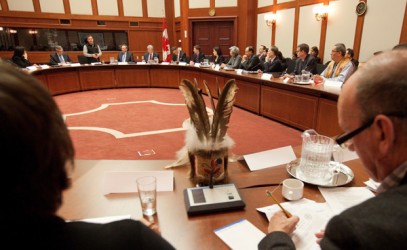Article Origin
Volume
Issue
Year
Success is not defined by a single meeting with the Prime Minister. Success is about what led up to the Jan. 11 meeting with him and what will follow.
“At the end of the day, what’s most important is that we had an eight-point consensus document … but it’s only going to mean something if we continue to gather strength and keep the pressure on,” said Snuneymuxw Nation Chief Doug White.
It was delegates from a divided Assembly of First Nations that met with Prime Minister Stephen Harper for four hours. Chiefs from Saskatchewan, Manitoba and Ontario boycotted the meeting, although there were chiefs from those provinces who attended on their own.
“It was not a simple straightforward meeting, for sure. There was a lot of complicated stuff around it,” said White.
Only days after AFN National Chief Shawn Atleo requested a meeting with Harper, the Prime Minister agreed. Chiefs met for two days and hammered out a statement of issues to present to Harper. The eight points raised were: the establishment of a framework for the implementation of treaties; reformation of the comprehensive lands claim policy; resource revenue sharing; legislation consistent with Sect. 35 of the Canadian Constitution and the United Nations Declaration on the Rights of Indigenous Peoples; a fiscal relationship that removes caps to funding; national inquiry into violence against Indigenous women and girls; improved education services; and a new government mechanism to address the work that needs to be undertaken.
AFN Regional Chief Perry Bellegarde helped lead the strategy sessions that resulted in the eight-point presentation, but Bellegarde, as head of the Federation of Saskatchewan Indian Nations, did not attend the meeting with Harper.
“I didn’t go in out of respect for my Saskatchewan caucus,” said Bellegarde. The caucus boycotted the meeting to show its disappointment with Harper’s decision to limit the number of presenting delegates and Governor General David Johnston’s decision to not attend.
Convincing many of the chiefs to boycott the meetings was Attawapiskat Chief Theresa Spence, who had begun a hunger strike on Dec. 10. Cross Lake Elder Raymond Robinson joined Spence one day later. Spence addressed the chiefs, and stressed that Johnston needed to be at the meeting.
“I see it as a logistics,” said White, “and I think she sees it as substantive.”
White is clear that he supports and respects Spence in her hunger strike, understands the symbolism of her struggle, and appreciates the attention her actions have brought to the conditions First Nations people live in.
Johnston hosted his own meeting, ceremonial in nature, on the evening of Jan. 11. Spence, Bellegarde and other boycotting chiefs attended.
While White doesn’t believe Johnston plays a role in the changes that need to occur, Bellegarde believes differently.
“He’s the Queen’s representative here in Canada and our relationship as treaty people is with the Queen … so our relationship with the sovereign is very important,” said Bellegarde.
Dissension among AFN members is not new.
AFN Regional Chief Roger Augustine points to 1982 when the Constitution was repatriated.
“We were in a similar situation. We had folks outside protesting we shouldn’t be in there negotiating … We had our own people outside and I was one of them. And we had other powerful and influential leaders sitting around the table,” he said. “It happens and it’s all part of the organization’s mandate. There’s always people who feel we’re not moving fast enough or strong enough.”
Augustine, who openly declares himself an Atleo supporter, doesn’t see what is happening as unhealthy.
“People have a right to question any leadership and they have a right to protest and they have a right to form an opposition.
Intelligent oppositions create a smarter leadership in terms of listening and moving towards a direction,” he said.
Bellegarde is quick to point out Atleo’s success as a leader.
“When is the last time that we had the eye of the Prime Minister and Cabinet for treaty implementation? When is the last time we had the eye and focus that we can look at new mechanisms on behalf of the Crown for treaty implementation and deal with comprehensive claims so there’s no further extinguishment of Aboriginal rights and title? When did that happen last time? It hasn’t,” said Bellegarde.
Augustine attended the meeting with Harper.
“I walked out of there feeling we had made the right decision to meet with him,” he said. “We dealt with policy issues, but mainly we focused on setting the tone for future talks… and if it’s any indication, if that is the tone for our future meetings, I think we’re going to move along fairly quick in getting things done.”
Harper responded to each point and committed to a high level political process on treaty implementation and comprehensive claims policy, as well as ensuring that his office and the Privy Council would oversee these discussions.
White doesn’t share Augustine’s outlook.
“I am absolutely not convinced (there will be changes) and that’s why it’s not an issue of optimism,” said White.
- 13025 views

